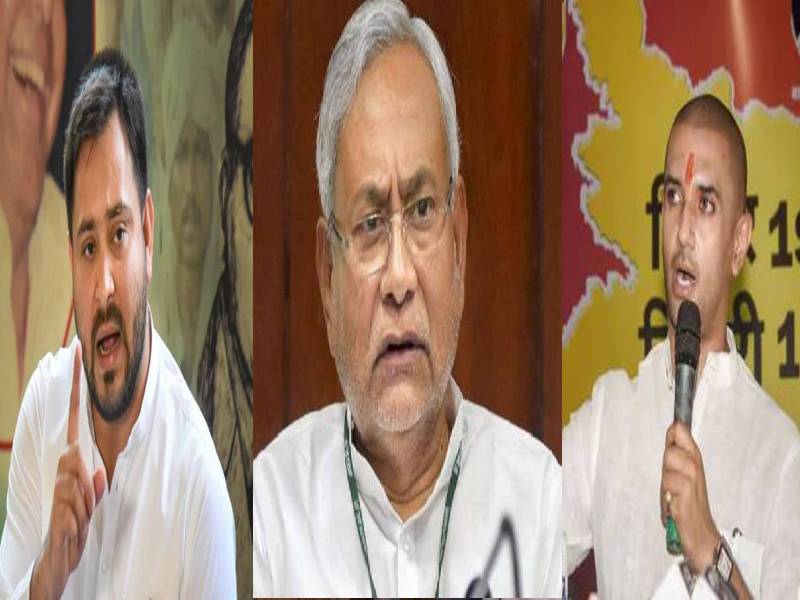Explainer: All about Bihar legislative assembly election
By Sumit Jha Published on 27 Oct 2020 11:31 AM GMT
Hyderabad: Bihar election is one of the complicated polls in the country. None of the political parties in Bihar has won a majority of its own in the last 30 years. They have formed a government only after forming an alliance.
The election will be held in three phases for 243 seats. On October 28, 71 seats will go to polls. On November 3, the election will be held on 94seats. On November 7, 78 seats will go to the polls. The results will be declared on November 10.
Two major coalitions are fighting elections in Bihar
National Democratic Alliance (NDA) comprises Janta Dal-United (JDU), Bharatiya Janta Party (BJP), Hindustani Awam Morcha (HAM), and Vikasheel Insan Party (VIP).
JDU is fighting on 115 seats and Bharatiya Janta Party is contesting 110 seats. HAM is contesting seven seats, while VIP is fighting on 11 seats. Nitish Kumar is the chief ministerial candidate of the NDA.
Mahagathbandhan include Rashtriya Janta Dal (RJD), Indian National Congress (INC), Communist Party of India, Communist Party of India (Marxist), and Communist Party of India (Marxist-Leninist).
RJD is fighting on 144 seats and INC is contesting 70 seats. CPI is fighting on six seats, CPI (M) is contesting 4 seats and CPI (ML) is fighting on 19 seats.
Tejashwi Yadav is the chief ministerial candidate of Mahagathbandhan. He is the former deputy chief minister and son of the former railway minister Lalu Prasad Yadav.
Lok Janshakti Party (LJP) is fighting alone in the Bihar election. LJP is part of the NDA at the centre. LJP leader Chirag Paswan has quit the alliance in the state. LJP is contesting 135 seats. LJP leader said he will form the government in Bihar with the support of BJP.
Other Parties:
There are more than 120 political parties fighting elections in Bihar. Some of these parties were part of either of the alliances in the past. Mayawati led Bahujan Samaj Party is contesting the election with Rashtriya Lok Samta Party and Janvadi Party (Socialist).
Asaduddin Owaisi led All India Majlis-e-Ittehadul Muslimeen is also fighting the election in Bihar with Janta Dal (Democratic). Lalu Yadav’s estranged brother in law Pappu Yadav’s Jan Adhikar Party is fighting the election with Dalit youth leader Chandrashekhar Azad’s Azad Samaj Party. Social Democratic Party of India and the Bahujan Mukti Party are also in the fray.
Shiv Sena and Loktantrik Janta Dal are also trying their luck in the election.
Nitish Kumar became Chief Minister for the first time in 2000 for seven days. In 2005, he again formed the government with BJP and was chief minister till 2014 when he gave up the post. Jitan Ram Manjhi (who later formed HAM) became chief minister for 278 days after JDU suffered defeat in the general elections. He became the chief minister when he aligned with Rashtriya Janta Dal and Congress in 2015. But he later parted ways and formed a government with the support of BJP in 2017.
Caste arithmetic:
There is a well-known phrase in Bihar: “We don’t cast our vote, we give a vote to our caste”. Bihar election is well known for its caste politics. For the people of Bihar, BJP is the party of the upper caste; RJD is the party of Yadavs, while Nitish Kumar is the party of other OBC’s except Yadav.
Fifty-two per cent of the Bihar population is OBCs, 15 per cent Schedule caste, 16.9 per cent Muslims, 15 per cent upper caste also known as forward caste, 1.7 per cent Adivasis, and other castes.
Caste politics became dominant in the 1990s after the Mandal commission submitted a report to the central government. In that movement, Lalu Yadav emerged popular OBC leader and became the chief minister in 1990. His tenure is known for ‘Chara Ghotala’ (fodder scam). Given the law and order issues, his rule was termed as ‘Jungle Raj’.
Caste politics is integrated into the politics of Bihar. In this election, BJP gave 51 seats to the upper caste out of 110 seats which are around 25 per cent of total seats.
This year's election is changing the dynamics of caste politics in Bihar. Mahagthbandhan chief ministerial candidate Tejashwi Yadav is fighting the election on the issue of Rozgar (employment) which is creating buzz around Bihar. Every party manifesto promises Rozgar. Some have promised 10 lakh jobs and some have assured to create 19 lakh jobs.
The young unemployed voters are moving away from the generalized caste politics.
